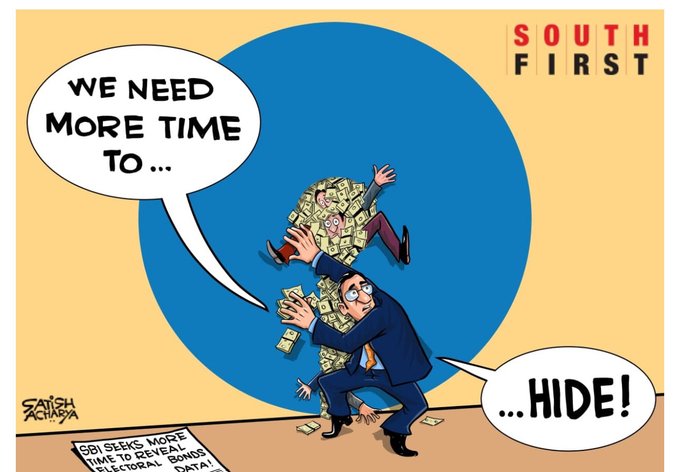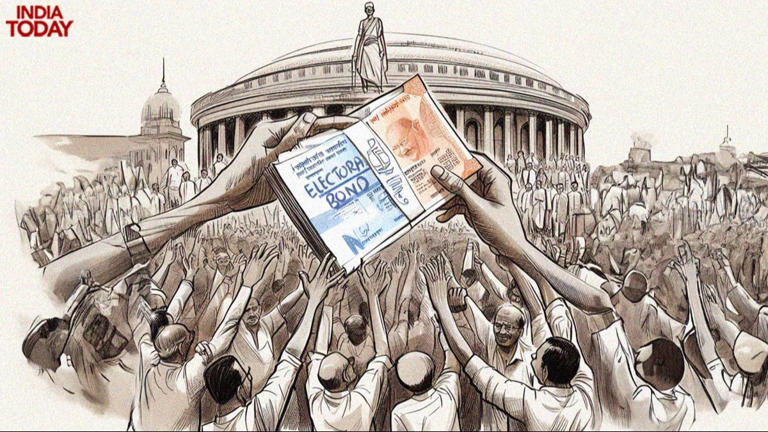Judah’s Limerick
But when the Supreme Court asks for some data so very vital
Boy oh Boy!

News Story
Hours before the expiry of the deadline, the State Bank of India (SBI) has approached the Supreme Court seeking an extension of time to fulfil the directives mandated by the court regarding the disclosure of the details of Electoral Bonds purchased since April 12, 2019. This application comes in response to the recent judgment delivered by the top court on February 15, 2024, which had struck down the Centre’s Electoral Bonds Scheme for political donations, calling it ‘unconstitutional’.
Among the operative directions issued by the court was the mandate for SBI to furnish details of Electoral Bonds purchased and redeemed since the interim order of April 12, 2019 through which the top court had made it clear that the legality of the scheme was under consideration by the Supreme Court. These details encompass crucial information such as the date of purchase, the identity of the purchaser, denomination of the bond, and particulars of political parties receiving contributions through Electoral Bonds.
However, SBI has encountered practical hurdles in decoding the information and adhering to the timeline stipulated by the court. The bank has highlighted the intricacies involved in reconciling donor information while upholding anonymity, as mandated by the provisions of the Electoral Bond Scheme 2018, and its accompanying guidelines.
According to the Gazette Notification issued on January 2, 2018, donor information was to be treated with utmost confidentiality by the authorised bank, with stringent measures in place to safeguard anonymity. SBI has outlined a comprehensive Standard Operating Procedure (SOP) governing its 29 authorised branches spread across India, emphasising the non-entry of purchaser details into the Core Banking System (CBS).
The bank further elaborated on the decentralised nature of data storage, with information pertaining to bond issuance and redemption maintained in separate silos. Retrieving and reconciling this information poses a significant challenge, especially given the substantial volume of Electoral Bonds involved a staggering 22,217 bonds utilised for donations during the specified period, as stated by the SBI.
In light of these challenges, SBI has submitted a request for an extension until June 30, 2024, to comply with the directives laid down by the Supreme Court. The bank contends that the three-week timeline provided in the judgment would be insufficient to undertake the exhaustive exercise of decoding, compiling, and cross-referencing the extensive trove of information.
As expected, the SBI’s move to seek more time has attracted criticism from the legal fraternity and opposition parties alike.
Anjali Bhardwaj, an activist, expressed frustration with the SBI’s delay in disclosing the information. According to her, both donor names and redemption details of electoral bonds are available in SBI’s Mumbai branch, but the bank has yet to make this information public. Bhardwaj criticised the bank’s claim that it needed four months to match purchaser and redeemer information for over 22,000 bonds, labeling it as “ridiculous”.
Congress leader and Senior Advocate Abhishek Manu Singhvi echoed similar sentiments, accusing the government and SBI of attempting to obstruct disclosure. Singhvi had predicted delays and diversion tactics following the Supreme Court’s judgment on electoral bonds. He emphasised the importance of disclosing this information before the general elections, suggesting that the opposition intended to make it a major election issue.
Former Union Minister and lawyer Manish Tewari called upon the Supreme Court to intervene and prevent SBI from employing “chicanery” regarding the electoral bonds. Tewari emphasised the need for transparency, asserting that voters must know who received donations and whether any quid pro quo was involved. He urged the court to lift the corporate veil of special purpose vehicles (SPVs) known as electoral trusts to reveal the true identity of donors.
Veteran lawyer and activist Prashant Bhushan accused the Modi government of filing an application through SBI to delay disclosing donor names until after the elections. Bhushan suggested that releasing this information would expose several bribe givers and their connections to government contracts and favours.
Congress President Mallikarjun Kharge accused the Modi government of using SBI to conceal its alleged dubious dealings through electoral bonds. Kharge referenced the Supreme Court’s previous ruling, which deemed the electoral bonds scheme unconstitutional and violative of the Right to Information Act. He criticised the government’s attempt to postpone the disclosure of donor details until after the Lok Sabha elections, alleging that the BJP was the main beneficiary of the scheme.
Lastly, Trinamool Congress MP Mahua Moitra criticised the SBI’s move, suggesting that the public sector bank was bending over backwards to ensure that the BJP’s donor list remains undisclosed before the elections.
On April 12, 2019, after considering the arguments presented by various parties, including the Election Commission of India, the Supreme Court directed all political parties that had received donations through electoral bonds to submit detailed particulars of the donors to the Election Commission of India. These particulars, including the amount of each bond and the details of the bank account into which the sum was credited, were to be provided in sealed covers.Â
The sealed covers containing the donor details were to remain in the custody of the Election Commission of India, subject to further orders from the court. These interim measures aimed to ensure transparency and accountability in political funding while maintaining the integrity of the electoral process.
Considering that the Supreme Court in April 2019 itself had directed that all data and records pertaining to donations made through Electoral Bonds should be compiled and kept with the Election Commission, it comes as a surprise that less than 48 hours before expiry of the deadline, the SBI has informed the top court that these details are not available at hand.Â
Justice Deepak Gupta, former judge of the Supreme Court, who was part of the Supreme Court bench that passed the April 2019 order, speaking to a digital media outlet, called the SBI’s application “absolutely ridiculous”. He stated that he did not agree with the SBI’s reasoning that collating the Electoral Bonds data is going to be a time-consuming process. “It should take a few days at the most, if not a few hours,” Justice Gupta said in a conversation with veteran journalist Karan Thapar.Â
“The SBI application says that there are over 22,000 bonds sold after 2019. The Court had clearly directed that this information must be kept by them. They were duty bound to ensure that the details are kept in such a manner that when the court asks them to disclose it, they should disclose it as early as possible and not take months to do it,” Justice Gupta said, highlighting that in his opinion, “SBI’s explanation is not worth much.”
“If this application is allowed, it will scuttle the very basis of the Supreme Court judgment,” Justice Gupta stated, making it clear that even if the Supreme Court allows extension of the date, it should not be a date after the elections. “People have a right to know,” the former top court judge said, echoing what the Supreme Court Constitution bench had said in its final verdict on February 15, 2024.
_______________________________________________________

